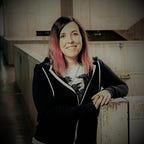Dear Dr. Elena: How Outreach Kills the Science Stereotype
You don’t look like a scientist.
Have you ever been told this? I get it quite often. Sometimes from children, but also from adults. Occasionally, if I feel like turning that comment into a discussion, I ask:
How so?
They would hesitate, tilt their head, and make a careful comment about my outfit or my hair.
And you are a girl.
Of course, this comment never comes from an adult — they know how inappropriate it is. But children, with naïve and brutal honesty, have said this in the past. I am a young woman, and that doesn’t really fit into the outmoded picture that most people still have of a scientist.
We most certainly don’t look like Bill Nye. Or at least not all of us. Science includes a vast range of people from different cultures, ages, genders and ideologies. We‘re as varied as humanity itself. But somehow, still, in 2017, most people would think of an old white man if they have to picture a scientist.
Kids around the world have been mainly depicting scientists as scruffy white, old men in lab coats and glasses. Representation of female scientists or scientists from other ethnicities in culture has not been good enough. This is the importance of science education programs that bring scientists closer to school-age students and the general public. I’m involved in a number of science education and communication projects to explain science in a friendly and informal way. And although I enjoy talking science with non-scientists, I like talking science with children even more.
I volunteer at the Fleet Science Center of San Diego, where I spend the first Saturday of each month teaching young girls about science in our Science Club for Girls, and I also visit middle schools with the Salk mobile science lab to teach DNA to kids between 11 and 14 years of age. The efforts of the teams involved in these projects are amazing and of tremendous impact on the young students. The beauty of these programs is that young people are open minded and curious, and are not afraid to ask.
Shockingly at first, I usually get questions about my origins (I’m Spanish) and how I managed to become a scientist, rather than about the science itself. They’re curious to know whether it was harder to get a job in science because I’m a woman, or whether I had trouble coming from Spain, or learning English, or if my boss cares about my looks.
I must admit that I find those conversations amusing more than anything, and even as a diversion there is a valuable lesson to be had. They realize that scientists are not the stereotypes they have in their heads. Once they get the chance to talk to me or any of my colleagues on a personal level, they realize that we’re real people with interests outside of science, and that we don’t all look like Bill Nye. Most importantly, we are relatable.
A couple of months ago I received a few thank you letters from students that I had the chance to meet during one of our visits with the Salk mobile science lab to a county middle school. They were all touching, but one stood out. Reading about the impact that we made on her was as exciting as seeing my work published in a big journal. Sometimes science goes beyond the bench.
Transcription:
Dear Dr Elena,
Thank you for teaching and helping me throughout the gel electrophoresis example. You inspired me even more to become a scientist. Your careers like being a neuroscientist and microbiologist are exactly like what I want to do with my future. I will certainly try to make it to your classes at the Reuben H Fleet science center every first Saturday of the month. One thing that mostly inspired me more is to know that a girl got a doctorate and got a job in STEAM. Everyone kept telling me there wasn’t much of a chance I was going to become a doctor or be a scientist because employers prefer men over women. But you are living proof that women can have a career in STEAM and be a doctor. Thank you so much for all you did, even though it seems you didn’t do much, you did a lot for a little girl with a big dream. Like you said I truly will never give up on science, I promise.
Originally published at blogs.nature.com on July 5, 2017.
